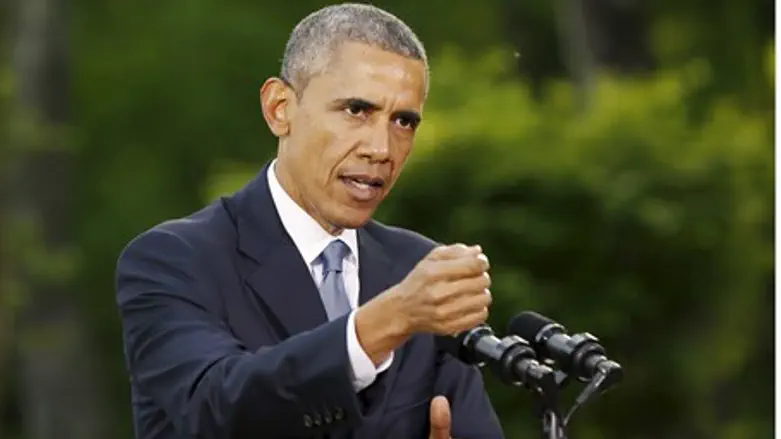
President Barack Obama is continuing his criticism of Prime Minister Binyamin Netanyahu’s comments on a Palestinian state and Arab-Israelis before the last elections.
In an interview with journalist Jeffrey Goldberg of The Atlantic, Obama said that the security relationship between the United States and Israel will remain strong, but reiterated that there will be “consequences” from Netanyahu’s remarks.
“In every public pronouncement I’ve made, I said that the bedrock security relationships between our two countries—these are sacrosanct. Military cooperation, intelligence cooperation—none of that has been affected. I have maintained, and I think I can show that no U.S. president has been more forceful in making sure that we help Israel protect itself, and even some of my critics in Israel have acknowledged as much,” Obama said.
“I said that none of this should impact the core strategic relationship that exists between the United States and Israel, or the people-to-people relations that are so deep that they transcend any particular president or prime minister and will continue until the end of time,” he added.
“But what I did say,” Obama continued, “is that when, going into an election, Prime Minister Netanyahu said a Palestinian state would not happen under his watch, or there [was] discussion in which it appeared that Arab-Israeli citizens were somehow portrayed as an invading force that might vote, and that this should be guarded against—this is contrary to the very language of the Israeli Declaration of Independence, which explicitly states that all people regardless of race or religion are full participants in the democracy.
“When something like that happens, that has foreign-policy consequences, and precisely because we’re so close to Israel, for us to simply stand there and say nothing would have meant that this office, the Oval Office, lost credibility when it came to speaking out on these issues,” he added.
“And when I am then required to come to Israel’s defense internationally, when there is anti-Semitism out there, when there is anti-Israeli policy that is based not on the particulars of the Palestinian cause but [is] based simply on hostility, I have to make sure that I am entirely credible in speaking out against those things, and that requires me then to also be honest with friends about how I view these issues,” Obama clarified.
His comments were referring to Netanyahu comments on election day that "huge numbers of Arabs" were coming out to vote, adding that many were being brought to the polling booths by V-15 and other NGOs funded from abroad.
Netanyahu's remarks caused a firestorm in Israeli media, with many accusing the Prime Minister of using racism to win over voters.
The United States was similarly displeased with Netanyahu's comments. White House Spokesman Josh Earnest noted that they were "deeply concerned by decisive rhetoric that seeks to marginalize Arab-Israeli citizens."
Netanyahu subsequently apologized for the comments, but Washington was not convinced and said the United States expects Netanyahu’s words to backed by actions.
The other comment that irked Obama was Netanyahu’s statement, in a series of interviews during the election campaign, that he would do everything in his power to prevent the establishment of a Palestinian state.
He appeared to backtrack after the election, explaining in an interview, but once again the White House was not impressed. Obama’s spokesman declared that since Netanyahu had said he was no longer committed to the two-state solution, “that means we need to reevaluate our position in this matter, and that is what we will do moving forward."
